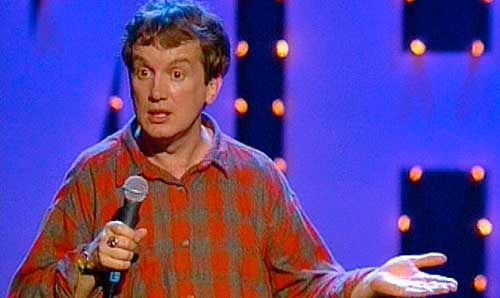
British stand-up comic and talk-show host Frank Skinner has never been politically correct.
But now he’s done it. He’s come out of the closet. He’s dared to defy the establishment and reveal that, yes, the rumors are true. He can’t deny it any longer. He’s tired of hiding. He’s … a Christian.
“By outing himself as a believer – even in miracles, God help us – Skinner was sticking two fingers up at the liberal establishment,” marvels entertainment writer Cristina Odone at the daily newspaper the Telegraph. “The BBC, a pillar of that establishment, for whom Skinner works, has shown what it thinks of religion.
“They have nipped and tucked at God slots for years, so now the skeletal model looks nothing like its original, vibrant self. Atheists such as Charles Handy share their scepticism on’ Thought for the Day,’ and the new “face” of BBC religion is Dr Francesca Stavrakopoulou, a self-proclaimed atheist. As for Richard Dawkins, his non-stop exposure and fanatically loyal ageing groupies have turned him into the Cliff Richard of atheism.”
But the man advocating that we “stop giving in” to atheists is a popular entertainer, the football-loving king of “laddish” humour. The issue is no longer a surprising rethink; it is a breathtaking act of subversion.
For Skinner, a recent stint at the Edinburgh Fringe confirmed just how ‘cool’ atheism is. He saw fellow stand-up comedians going out of their way to parade their atheist credentials, “just to tick the box of cool comic,” In the 1970s and ’80s, dissing Margaret Thatcher was the sure way for a funnyman (or woman) to seal their status as a must-see; the Iron Lady always drew a laugh when portrayed crushing her all-male Cabinet underfoot, or sneering with contempt at hoi polloi. Nowadays, God has stepped into the Baroness’s court shoes, and lots of fun can be had at the expense of [God]. Secularism on the comedy circuit is a crowd-pleaser; faith, a venue-clearer.
Yet Skinner has dared to go against the grain. He even had the audacity to write this in London’s Sunday Times some time back:
I really feel there is a God. I know atheism is extremely fashionable nowadays but I just can’t kick this believing thing. I must say that I have a lot of time for atheists. I respect anyone who gives this most momentous question a good deal of thought, whatever conclusion they finally arrive at.
I’m less keen on the glut of bandwagon atheists who’ve just unquestioningly joined in because they think the atheist label makes them sound clever and grown-up. I suspect that they see themselves in an elite senior common room with Bertrand Russell and Charles Darwin.
Is daring to proclaim his faith going to be suicidal to his career? He acknowledges in the Times that “many believers never question their own convictions but at least their dumb acceptance comes with an element of ‘safest option’ insurance.”
I’d have thought, in the bandwagon atheist’s case, that it’s worth having a proper think before turning your back on what might just be a life illuminated by faith.
It seems rash to screw up eternity on the strength of something that you read on the side of a bus.
I was baptized Roman Catholic but left the Old Church when I was 17 because I was an angry young man who couldn’t accept doctrine like papal infallibility, praying to saints and the gaining of indulgences. I read every book I could find on Catholicism — most of them condemnatory — but 11 years later I returned to the Church.
He admits that Christianity is not without its quirks and flaws:
I never had an epiphany — a single moment when I knew I must return — but I do remember identifying strongly with something I read by Hans Küng, a Swiss theologian rejected by the Vatican in 1979.
He said that the Roman Catholic Church was essentially on the road to truth but sometimes turned into cul-de-sacs; exactly what one might expect from a divine institution run by ordinary human beings.
That was more or less the attitude with which I returned to the Church: what Küng called a “critical loyalty.” I’ve met many impressive, even saint-like, Catholics who properly walk the walk; people whose faith has led them to a life spent helping others. When I see how the Church inspires such people it fills me with optimism for its future.
Skinner, it should be noted, is no Kirk Cameron. “I topped a chart of the world’s greediest people in the Daily Mirror,” remembers Skinner. “Imelda Marcos was fourth.” He has made a lot of money in entertainment with risque humor. Here’s a clip from his his talk show — a rare instance in which he does talk about his faith:
http://www.youtube.com/watch?v=DmRTj4kYNicThe atheists liked the clip enough to buy an ad at the end encouraging British subjects to click “No Religion” on their census.
“He is a teetotaller and devout Roman Catholic,” writes John Plunkett in the British newspaper the Guardian — not explaining that Skinner is actually a recovering alcoholic. “He talks about his faith on his radio show and in print – but never uses it in his standup act.” Why not? Perhaps because of what his fans expect of him? The raw and the crude? Plunkett relates a recent conversation:
“It’s still one of the barriers, I think. I’ve written bits of standup about being a Catholic but I’ve never actually tried them out,” he says. Because of his own sensibilities? “I don’t think it would offend my sensibilities. I suppose I think my old fans are still there in football shirts wanting me to talk about anal sex. In a way I don’t want to completely let them down.”
Upcoming projects include a documentary about [famous British soccer player] George Formby for BBC – he is a ukulele devotee – but plans for a novel have been permanently put on ice. His book – about a 50-year-old Christian superhero called Thunderman who sold out and got bored – stalled at 60,000 words.
Can a Christian comic make it in the entertainment world?
“Catholics, with their pedophile scandals and birth control pangs, writhe with hot and heavy guilt,” writes Odone. Anglicans “tie themselves in knots over every controversial issue. Jewish neuroses have kept Woody Allen and Howard Jacobson in business for decades; while Muslims’ strictures, from no alcohol to no conversions, are too intense to be cool.
“Atheists, instead, look on all this ridiculously messy humanity from a perch high above the fray. Their superiority is not an unfortunate, smirky, expression that can be wiped away in an instant of self-doubt,” she writes. “They can afford to be laid-back, because they’re in control of what counts: the media, academia, and many of the professions.
“And yet,” asks the entertainment writer:
How to account, then, for Ian Hislop? Hislop, editor of Private Eye and regular panellist on ‘Have I Got News for You,’ has never hidden that he’s a practicing Anglican. A few years ago, in fact, he made a series on the Church of England, The Canterbury Tales.
“Hislop brought to his subject, his church, the self-deprecating wit that has made him a national treasure. He joked and ribbed, poking and prodding the ancient institution; the result was entertainment gold: the audience learned, laughing all the while. “I can’t believe he’s a Christian,” an erstwhile colleague at the New Statesman exclaimed. “He’s so funny!”
The same colleague would probably have said of Jeremy Vine, another practicing Anglican, “I can’t believe he’s a Christian, he’s so clever!”
Or of Bettany Hughes, “I can’t believe she’s an Anglican, she’s so telegenic!”
No, writes, Odone, “Frank Skinner is not alone. Despite the strident secularism of most programmers, the media is a hotbed of subversive believers. While some have come out publicly about their faith, most are reticent on the subject.
Odine shares how British media personality Carol Vorderman kept her faith to herself because, as Jeremy Vine told an interviewer, “blurting out your belief” would be “destructive” to an entertainer’s job: “It is now almost socially unacceptable to say you believe in God.”
Odine muses on whether that is changing:
Perhaps now these high-profile figures will dare take up Skinner’s challenge and take on the atheists. They may not seize the mic to proclaim their faith, but maybe they’ll stop apologizing for believing in mystery and eternity, self-sacrifice and divine authority.


